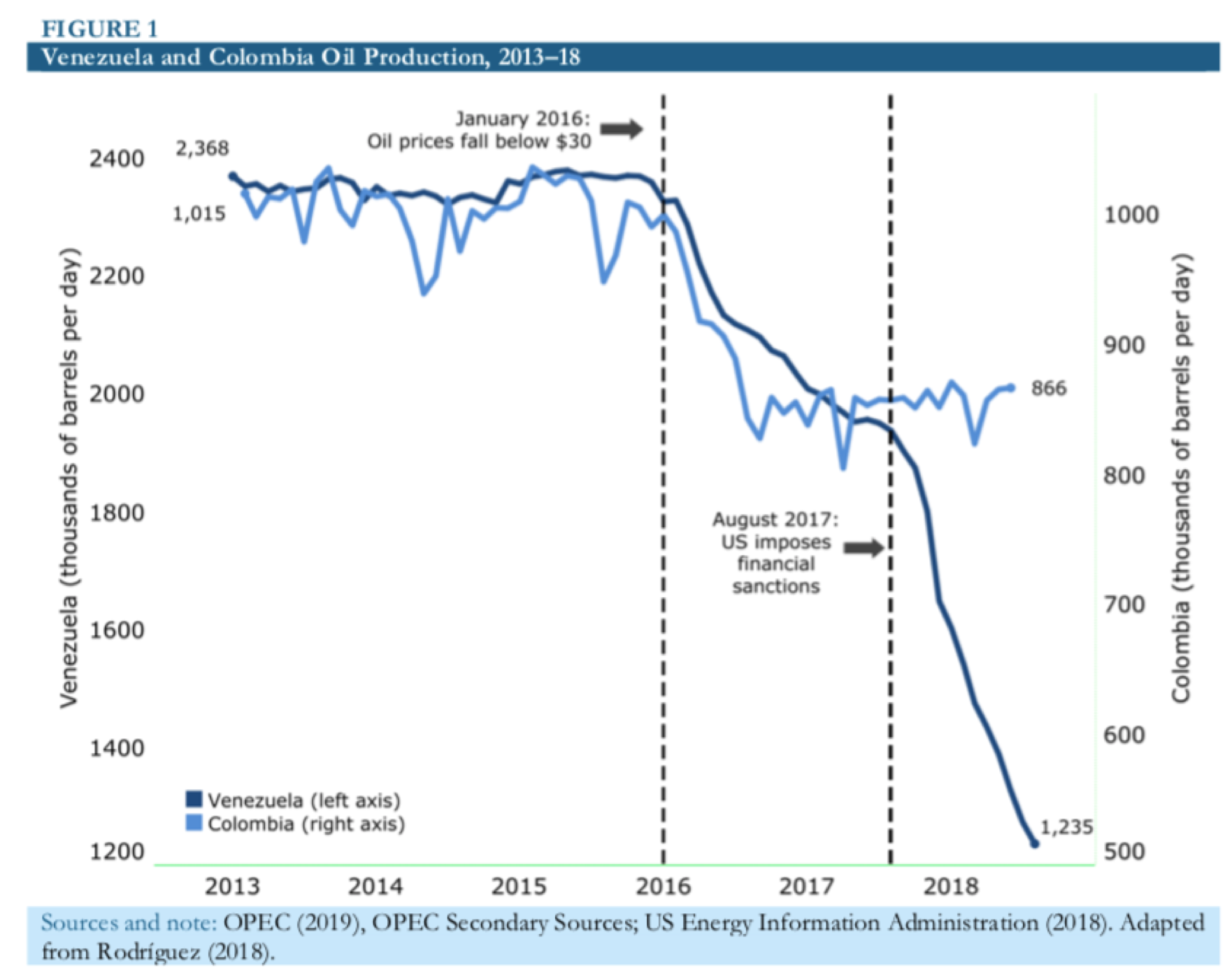





|
Tweet
|
|
|
A study "Economic sanctions as collective punishment: the case of Venezuela", by economists Jeffrey Sachs and Mark Weisbrot of the Center for Economic and Political Research based in Washington DC, determined that 40,000 people may have died in Venezuela as a result of the sanctions imposed by the United States since August 2017, making it difficult for ordinary citizens to access food, medicines and medical equipment. It also assigns to these economic sanctions the cause of the fall in oil production and the humanitarian crisis in Venezuela. The regime of Nicolás Maduro is creating the story that the sanctions of the Trump government to the state oil company Pdvsa -block since last February of assets in the United States and 11 billions of dollars in future sales; prohibition since past May to carry out transactions with Pdvsa and sanctioned officials; and the prohibition since July of the purchase of crude oil from Pdvsa using the dollar's financial system, and the operations of Chevron, Schlumberger, Halliburton, Baker Hughes, Weatherford- contribute to the increase in deaths in the poorest and most vulnerable sectors of Venezuelan population. Also, Sachs and Weisbrot affirm that these sanctions would fit in the definition of "collective punishment to the civil population". That is to say, that the United States, the interim president Juan Guaidó, and the National Assembly are sanctioning the entire population for the usurpation of Maduro from the presidency of Venezuela, without the people having any responsibility. The argument of Sachs and Weisbrot is that the sanctions of August 2017, which prohibit the Maduro regime from applying for loans in the US financial markets, blocked the restructuring of Pdvsa's external debt because "it required the issuance of new bonds in exchange for the existing debt". The Pdvsa bonds in question were issued in European brokerage houses (primary market) to evade the requirements of the US Securities and Exchange Commission (SEC). A debt that has facilitated currencies to corruption, illicit activities and the debt service, and it has not been invested for the development of oil activities. So, establishing the root cause of the fall in oil production in 2017 and 2018 to the lack of refinancing of Pdvsa's debt is false. Establishing a correlation between investment and maintenance with the behavior of oil production is legitimate; however, to affirm that the collapse of Pdvsa's oil production in 2017-2018 was due to the lack of restructuring of the debt means that the available resources were going to be used to maintain and increase the production potential. Comparing the production curves of Colombia and Venezuela leads to a false conclusion because the management of the oil industry in both countries is different. The ultimate goal of Ecopetrol is to maximize profits to shareholders, while Pdvsa is the financial and diplomatic arm of the Mafia State. Based on this conclusion, the report supports the thesis that the Venezuelan State stopped receiving foreign currency revenues due to the fall in exports and therefore does not have dollars, "8.4 billion", to make imports of food and medicines. Also, it establishes that the reduction of currency impacts in the price index of the products, causing the hyperinflation that affects Venezuela - the study omits that the printing of money from the Central Bank of Venezuela finances Pdvsa. As Venezuela is a Mafia State, the Financial Crimes Enforcement Network of the United States Department of the Treasury issued, on September 20, 2017, a "notice to US financial institutions about widespread political corruption in Venezuela" and requested to "take measures to rule out that funds and other assets are not the product of Venezuelan public corruption". This decision of the United States Treasury "has had negative impacts on oil production, as well as on the economy" says Francisco Rodríguez in the study; "Because it led to the closure of Venezuelan accounts in financial institutions, the loss of access to credit and other financial restrictions". The rest of the report follows the same line of rationing that the sanctions of January 2019, executed to prevent the looting of Venezuelan assets abroad by the Maduro regime, strangle foreign exchange ($ 4.8 billion) for the import of goods. All this is to justify that sanctions have an impact on human life and health. Out of nowhere, they took a number, that the 40,000 deaths from 2017 to 2018 would be attributable to the sanctions of 2017, using the reference of the National Survey of Living Conditions (Encovi). The report concludes that the sanctions of the United States imposed in 2017 and 2019 on the Maduro regime fall under the category of "collective punishment of civilians", cataloged by the conventions of The Hague and Geneva. With this study, Maduro seeks to avoid the application of the Responsibility to Protect (R2P), adopted by the UN in 2005, which applies in the case of Venezuela for the humanitarian crisis. Besides blaming the United States and Juan Guaidó of the disaster in Venezuela. |

